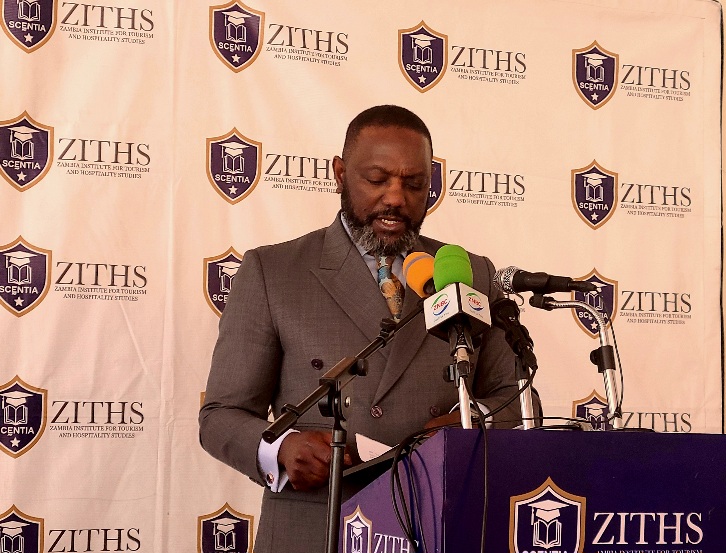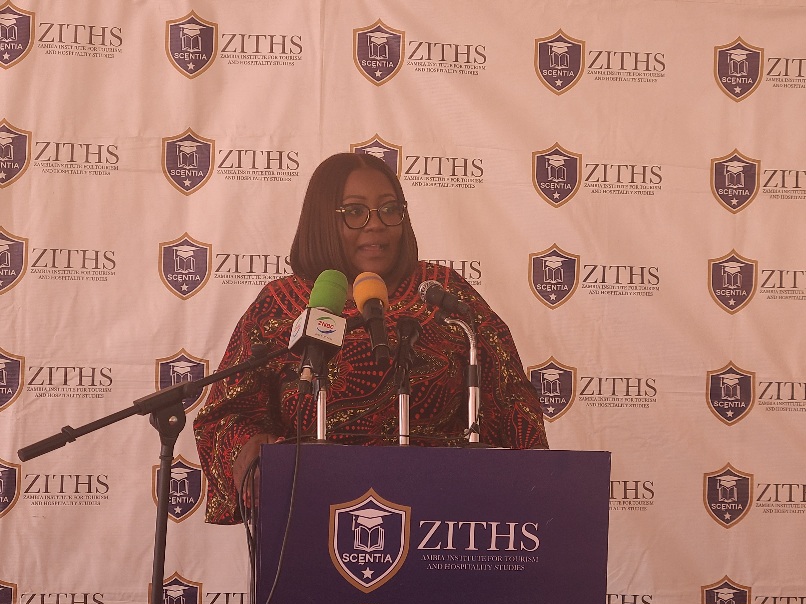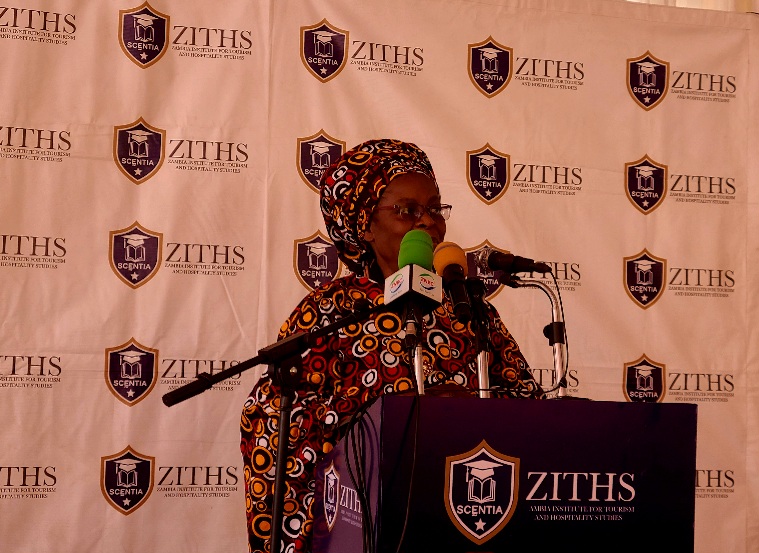Hospitality Training Upgraded

ZITHS unveils modern facilities to meet rising industry standards
By Francis Maingaila
Lusaka, Zambia24 - (August 6, 2025 )– The Zambia Institute for Tourism and Hospitality Studies (ZITHS) has officially launched a fully rehabilitated Food Science Laboratory at its Fairview Hotel Campus, in a bold move to align hospitality training with international standards and industry demands.
Speaking during the launch, Tourism Minister Rodney Sikumba said the new lab is a response to long-standing concerns about the gap between training and the practical needs of the tourism and hospitality industry.
He described the lab as a modern, multi-purpose space that will play a vital role in food quality assurance, culinary innovation, and workforce development.
“We are not just unveiling a building. We are opening opportunities,” Sikumba said.
“This facility will serve as a training ground to bridge the knowledge gap in areas such as food safety, local and international cuisine, and even aviation catering.”
He emphasized that the new infrastructure is aligned with the government's broader goal of transforming Zambia into a competitive tourism destination, by ensuring that service delivery is backed by practical, hands-on training.
The lab will also support the preservation and promotion of Zambian indigenous cuisine, a key element in the country’s tourism offering.
The laboratory, along with new kitchen and laundry facilities, is designed to equip students with practical skills in food science, housekeeping, and hotel management. It is funded through the Tourism Development Fund, which draws from a 1.5 percent levy on accommodation bills.
Tourism education has also been incorporated into the national school curriculum, starting from Early Childhood Learning (ECL).
Sikumba encouraged parents to support children pursuing tourism careers, noting that the sector’s contribution to the economy must be matched by investment in human capital.
Tourism Minister Sikumba said the facility will support the training of hospitality professionals to meet increasing demand, driven by rising tourist numbers.
Zambia recorded 1.2 million arrivals in the first half of 2025, up from 1.1 million during the same period in 2024.
“We cannot afford to have half-baked professionals. Poor service discourages return visits and hurts the sector,” Sikumba said.
ZITHS is now TEVETA-accredited, making students eligible for Constituency Development Fund (CDF) support. Sikumba urged Members of Parliament to enroll more youths in formal hospitality programs to address growing demand for skilled workers.
Sikumba also highlighted the need for reliable tourism data.
He said contributions from tourism are often misattributed to sectors like agriculture and transport, which distorts the industry’s actual impact.
To address this, the Ministry plans to establish a Tourism Satellite Account to capture data across the tourism value chain and strengthen the case for investment.
He further noted that the Ministry is working with mobile network operators to track domestic tourism trends and improve infrastructure in neglected tourist destinations, such as Lumangwe and Kabwelume Falls.
The Minister also emphasized the economic and cultural value of indigenous cuisine, calling for greater inclusion of organic Zambian dishes in restaurants, hotels, and even on airline menus.
He said foods like nshima are part of Zambia’s identity and could drive rural income growth if promoted more strategically.
Sikumba urged young people and entrepreneurs to explore opportunities in the Meetings, Incentives, Conferences, and Exhibitions (MICE) sector, describing it as a promising source of employment and business potential.
He concluded by urging training institutions to maintain high standards and affordability while producing fully trained graduates. He then officially declared the ZITHS Fairview Hotel Campus Food Science Laboratory open for use.

ZITHS Council Chairperson, Ms. Mulemwa Moongwa, said the laboratory is part of ongoing reforms at the institution, which became a statutory body under the Ministry of Tourism in 2016.
She noted that the current Governing Council, appointed in 2022, took office during a post-pandemic period when the institute needed to realign with industry demands.
“Our focus has been on aligning our mandate with the needs of the tourism sector. Between 2023 and now, our strategic direction included strengthening culinary and hospitality skills,” Ms. Moongwa said.
She cited findings from the 2023 Labour Force Survey, which revealed that 67% of workers in the sector had education levels between Grade 8 and Grade 12, while less than 2% held postgraduate qualifications.
“These gaps led us to adopt the UN Tourism Education Guidelines and to push for tourism education from early childhood to secondary school,” she said, adding that ZITHS is working to standardize certification and improve quality assurance across its programmes.
ZITHS Executive Director, Mrs. Anne Kaoma-Sibanda, said the new laboratory was made possible through the Tourism Development Fund (TDF), which also funded a training kitchen, a laundry facility, and an IATA-standard aviation laboratory.
She said these facilities were developed in response to industry feedback that graduates lacked practical exposure.
“The training kitchen simulates real-world culinary environments, while the laundry facility provides hands-on experience in linen management — an area often overlooked,” Mrs. Kaoma-Sibanda explained.
She added that the IATA lab equips students with skills in airline ticketing, cargo handling, and customer service, aligning their training with global standards.
Highlighting the newly launched food science laboratory, Mrs. Kaoma-Sibanda said it will enhance training in food safety, nutrition, preservation, and processing. The lab will also provide commercial testing services to hotels, food processors, and beverage companies.
“This is not just an educational resource. It offers a local solution to food testing, which many businesses previously outsourced to South Africa or the United States,” she said.
 Catering entrepreneur Sylvia Banda welcomed the development, saying the lack of affordable food testing facilities had hindered the growth of businesses promoting indigenous foods.
Catering entrepreneur Sylvia Banda welcomed the development, saying the lack of affordable food testing facilities had hindered the growth of businesses promoting indigenous foods.“I’m excited. This is our lab, and I will be bringing samples next week,” Banda said, urging ZITHS to keep the services affordable for local suppliers.
ZITHS is TEVETA-accredited and has positioned itself as a leading institution in building industry-relevant skills to support Zambia’s tourism and hospitality growth.
Speaking at the Zambia Institute for Tourism and Hospitality Studies (ZITHS) in Lusaka, Marshal Mulunda, a representative of STEM Zambia, underscored the critical role of home economics as a STEM-aligned survival skill in the 21st century.
Mr. Mulunda challenged traditional perceptions of home economics, arguing that it is far more than a domestic subject and should be embraced as a scientific discipline that incorporates biology, chemistry, psychology, and mathematics.
“Home economics is the backbone of national development. It teaches budgeting, food science, nutrition, hygiene, and even entrepreneurship,” he said. “Innovation doesn’t only happen in labs or tech hubs. It happens when science meets hospitality and creativity.”
He demonstrated the STEM connection: food preparation involves food chemistry, textiles rely on material science, kitchen engineering enhances productivity, and budgeting uses applied mathematics.
Mulunda also shared a personal story of how he used skills learned in home economics—specifically tailoring—to support his secondary education.
“Given only K50 for pocket money, I slim-fitted uniforms for classmates and earned K300 by term’s end,” he revealed, drawing attention to the subject’s life-changing potential.
Frank Murangwa, Regional Director for Africa at the International Congress and Convention Association (ICCA), praised the country for becoming the first in Africa to launch the ICCA Meetings Lab.
At the same event, Murangwa announced Zambia’s pioneering role as the first African country to implement ICCA’s Meetings Industry Education Programme.
The initiative is in partnership with ZITHS and aims to create structured education pathways in the Meetings, Incentives, Conferences, and Exhibitions (MICE) industry.
“The business events sector generates over $1.1 trillion globally and remains one of the highest job creators,” Murangwa said.
“Zambia is setting an example by investing in the future of meetings industry professionals.”
He noted that until now, the global meetings sector lacked a formal educational framework.
“This programme will empower a new generation of professionals, positioning Zambia as a competitive hub for business tourism in Africa.”
Murangwa also commended the Zambian government for its leadership in promoting tourism and skills development.
“We are proud to partner with Zambia’s tourism authorities and ZITHS in ensuring the continent benefits from this forward-looking initiative.”
He praised Zambia’s commitment to youth empowerment, STEM advancement, and tourism development. The dual themes of the event—STEM integration and meetings industry training—highlighted the government's efforts to diversify the economy and reduce youth unemployment.
“The future belongs to nations that turn their kitchens into classrooms and their classrooms into labs of innovation,” Mulunda said.
Murangwa added, “Zambia is not only participating—it’s leading the charge.”



Comments
Post a Comment